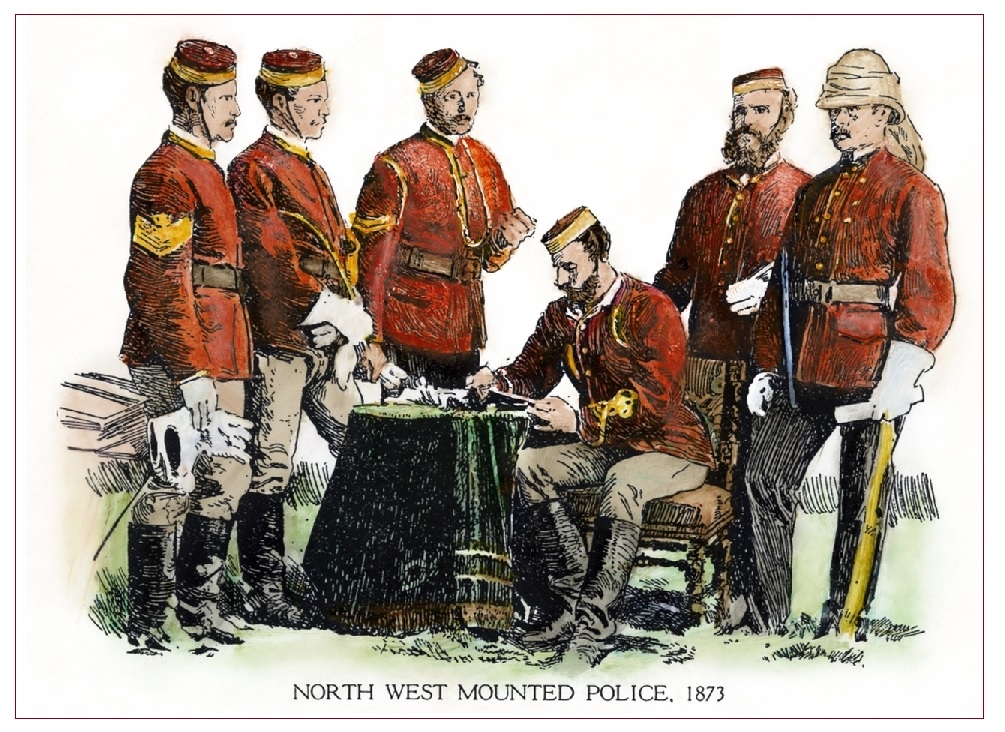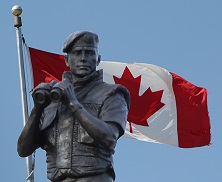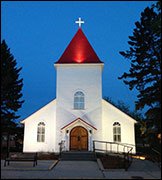True and Fascinating Canadian History
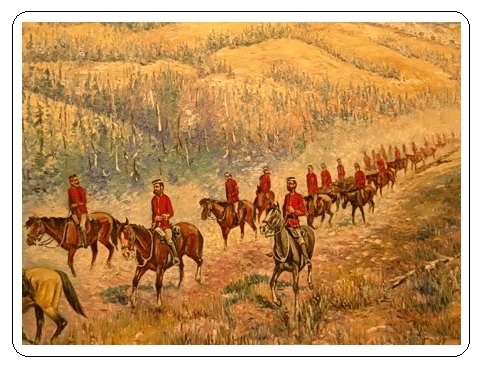
Vet of the Month: June, 2021
Members of The March West
and the Recent Discovery of their Graves
RCMP Vets. Ottawa, ON
No doubt many Canadians have some knowledge of the North West Mounted Police, and the ordeals which they endured during the March West and while they crossed the Canadian prairies during the summer, fall and early winter of 1874. But, with the exception of Superintendent Sam Steele, most Canadians might have difficulty recalling the names of the approximate 312 individual police officers who comprised the famous March West. Canadians may know very little of the hardships and the suffering which these men endured over several months. High on their goals was to secure the West and place it firmly under Canadian authority.
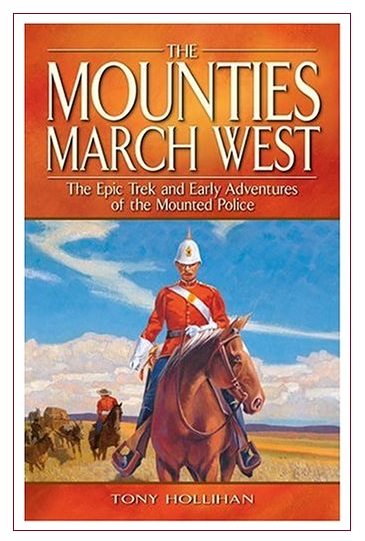
In Canadian history, the March West stands out as a nearly impossible goal which was doomed to falter, but the NWMP did not allow it to fail. Along the trek, the men faced hazardous weather conditions and thunder storms and snow, a lack of food and clean water, sick and suffering animals, harsh discipline, and poorly fitted boots and uniforms. There was no recreation and there was no space or allowance for intimacy. Day after day, they sacrificed their lives. It is important that these brave men be remembered and that sincere efforts be expended to discover their graves, and to maintain the condition of their final resting place.
The purpose of this short story is to highlight a few of these early pioneers of the NWMP, to recall their lives, and to recount what became of them after the March West. Many of the men ended their lives in sad circumstances and in tragedy. Their lives might have been extended if only modern medicine had been available including health care and psychological counselling protocols.
After the March West, many of the NWMP scattered to other parts of Canada, or to the United States. Some returned to Europe and the United Kingdom, and since 1874, very few records existed which would identify the whereabouts of the early NWMP March West pioneers. In addiiton, little has been known about how and when the men died, or the precise location of their graves. A few men were buried in historic RCMP cemeteries, but the vast majority of the graves of the men of the March West were never recorded. It may surprise Canadians, but in recent years several dozen graves of the March West have been discovered, documented, cleaned and photographed. Effort is also underway by RCMP Veterans to properly identify the many cemetery plots of deceased NWMP who lie in unmarked graves.
 Over the past twenty years or so, hundreds of dedicated RCMP Veterans all across Canada as well as hundreds of interested civil volunteers have devoted immense time, effort and research to finding the graves of the men of the March West. There has been great success -- about 202 graves out of the 312 total have been found! Research of official documents, birth certificates, death certificates, baptismal and marriage records and newspaper accounts is time consuming, but more and more success happens as more records become available and are searchable on-line.
Over the past twenty years or so, hundreds of dedicated RCMP Veterans all across Canada as well as hundreds of interested civil volunteers have devoted immense time, effort and research to finding the graves of the men of the March West. There has been great success -- about 202 graves out of the 312 total have been found! Research of official documents, birth certificates, death certificates, baptismal and marriage records and newspaper accounts is time consuming, but more and more success happens as more records become available and are searchable on-line.
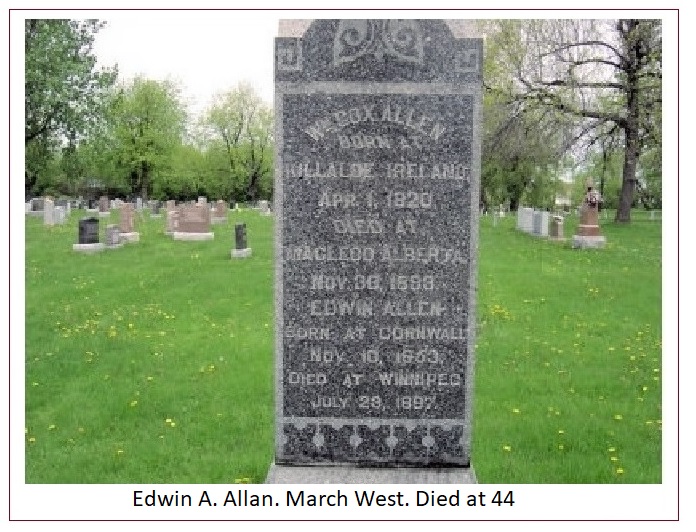
All the names listed below were members of the NWMP and active participants in the March West. In recent years, their graves have been found and photographed in cemeteries around the world.
Edwin A. Allen received a Commission in the NWMP in 1874. He resigned in 1877. After the NWMP, he was a Customs Officer in Coutts, AB, until alcohol problems forced his resignation once again. He died in 1897 at 44 years of age. He was originally buried in Winnipeg, MB, but his body was exhumed and reinterred in the Woodland Cemetery in Cornwall, ON. His grave (upper left) was found in the Allen family plot by RCMP Vets Jack O'Reilly and AJH 'Joe' Collinson.
William Davis 'Denny' Antrobus received a Commission to Sub-Inspector in 1876 then promoted to Superintendent in 1891. Later that same year he was suspended for 6 months and reduced to Inspector for being drunk in public and the misuse of public monies. His services were dispensed with and he was discharged. He died in 1899 at the age of 54. His grave was found in St James Anglican Cemetery in Trois-Rivières, QC by Merle Armstrong of the RCMP Vets in London, ON.
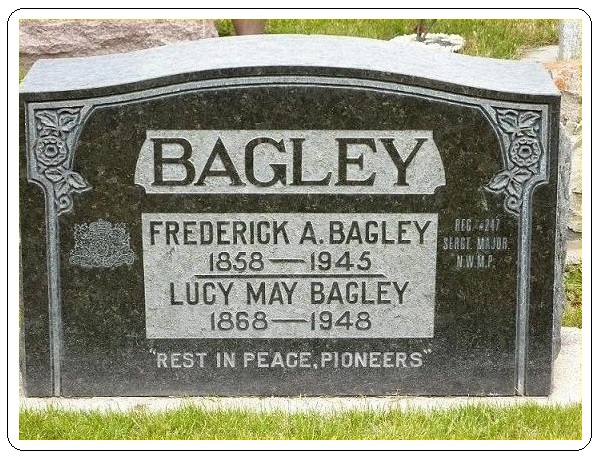
Frederick Augustus Bagley joined the NWMP in 1874, and he retired in 1899. He then fought in South Africa. He died in 1945 at 87. His grave was found in Banff, AB, by volunteer Mr. Reg Keatley.
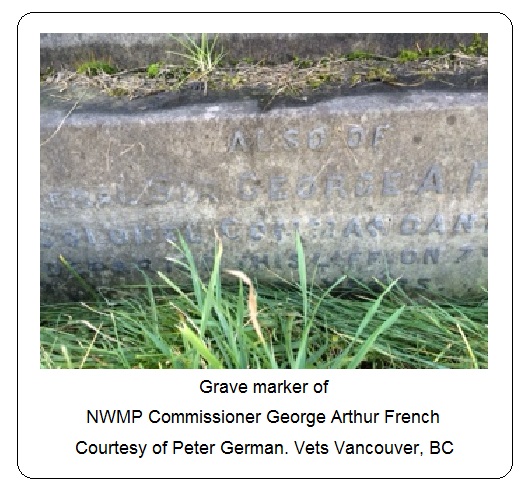
In 1873, Sir George Arthur French was appointed the first Commissioner of the Force. He resigned after the March West, and returned to London, England where he joined the Imperial Army. He died in 1920 at the age of 80. Commissioner French was afforded a full military funeral. He was buried in the Brompton Cemetery in London, England. In recent years, his grave was found and photographed by Vancouver, BC RCMP Veteran Peter German.
Alfred Joseph Bernard joined the NWMP in May, 1874. He served honourably and he left the Force in 1877. He returned to farming in Manitoba, but sometime around 1894, he moved to Idaho, in the United States. His grave was found by MB RCMP Veteran Neil Christoffersen in the Ogden City Cemetery, Ogden City, Idaho.
Prior to arriving in Canada, Jacob E. Carvell had served in the Confederate Army. He received a Commission in the NWMP in 1873. After the March West, he was granted leave in 1876 to visit his family in Virginia. He resigned his Commission from Boulder, Colorado. I found his grave in Rileyville, Virginia, USA.
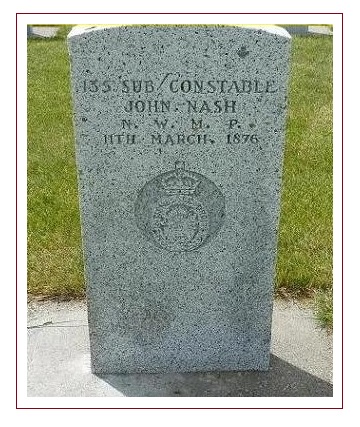
Sub Constable John D. Nash joined in 1873. After the March West, he served in the Fort MacLeod area. His death in 1876 was accidental, and it was the first death in the NWMP attributed to a duty-related cause. Nash was hauling logs with a team of horses for the construction of buildings at Fort MacLeod. He was riding on top of the load. While going down a hill, the load spilled and he was fatally crushed by falling logs. His grave was located in Union Cemetery in Fort Macleod, AB.
Sub Constable J. H. S. Beaulieu served for three years in Fort Saskatchewan, AB after the March West then he left the Force, and he returned to Manitoba. The Winnipeg Free Press reported that he drowned while crossing the Red River on foot from Winnipeg to St Boniface. His body was never recovered.
Sub Constable Frank Baxter and Sub Constable Thomas D. Wilson died on duty with the NWMP. They served beginning in 1874 and they died the same day in 1875 after getting lost in a snow storm near Fort Kitt, AB. Their graves were located by volunteer Mr. Reg Keatley in Union Cemetery in Fort Macleod, AB.
Sergeant Alexander N. Desforges served very honourably for several years after the March West of 1874. Later, he moved to Manitoba then to the USA. He died in the Hastings State Insane Asylum in Minnesota in 1926 at the age of at 74. Research by Veteran Merle Armstrong revealed that Sergeant Alexander N. Desforges remains were shipped to St. Paul, Minnesota, USA for burial.
Sub Constable Elliott Thorton joined the NWMP in 1874. One day after the March West got underway, Thorton decided to take a stroll to hunt for fresh game. He got lost and his horse collapsed from exhaustion and malnutrition. Thornton eventually found his way back to camp five days later. The hard life in the fledgling Mounted Police Force was not to his liking.
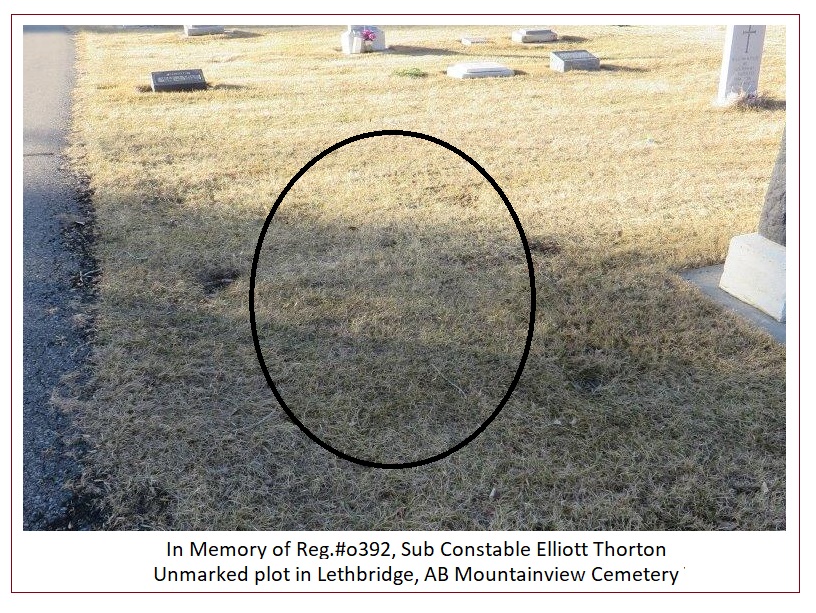
Thorton deserted after one year service in the NWMP and he headed for Montana. He married in 1877 in Fort Benton, MT, and on October 12, 1906, the Great Falls Tribune recorded his divorce. A week later, he remarried and moved back to southern Alberta. Thorton's true identity was never uncovered by the authorities. He died in 1931 at the age of 79. Thorton lies in an unmarked grave in Mountainview Cemetery in Lethbridge, AB. It was discovered by MB RCMP Veteran Neil Christoffersen. Thorton's plot was photographed by Al Baldwin and Mike Duffy of the Lethbridge, AB RCMP Veterans Association.
All members of the NWMP deserve to be recognized for their effort to secure the new country of Canada. For the most part their lives were not easy, and I would like to express my gratitude to all our volunteer Veterans and citizens for working so hard to uncover these important details of our nation's past. In my estimation, the ongoing work to discover the final resting place of the NWMP is part of a very worthwhile Canadian project.
Reporting from Fort Healy,
J. J. Healy
June 23, 2021
